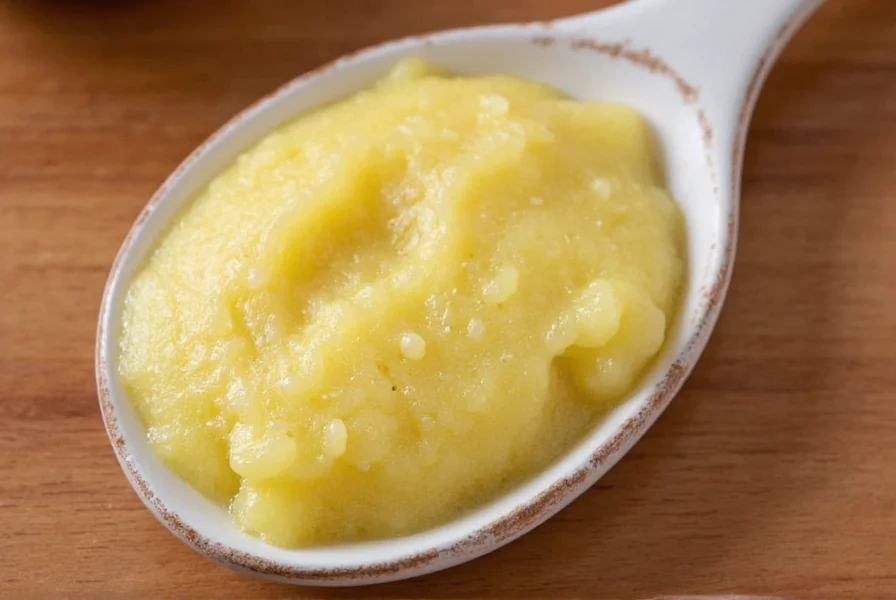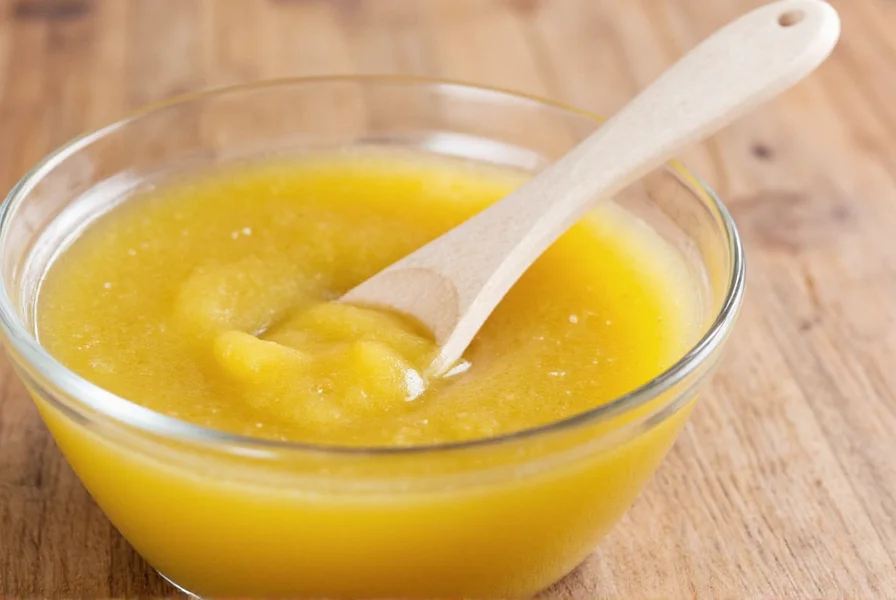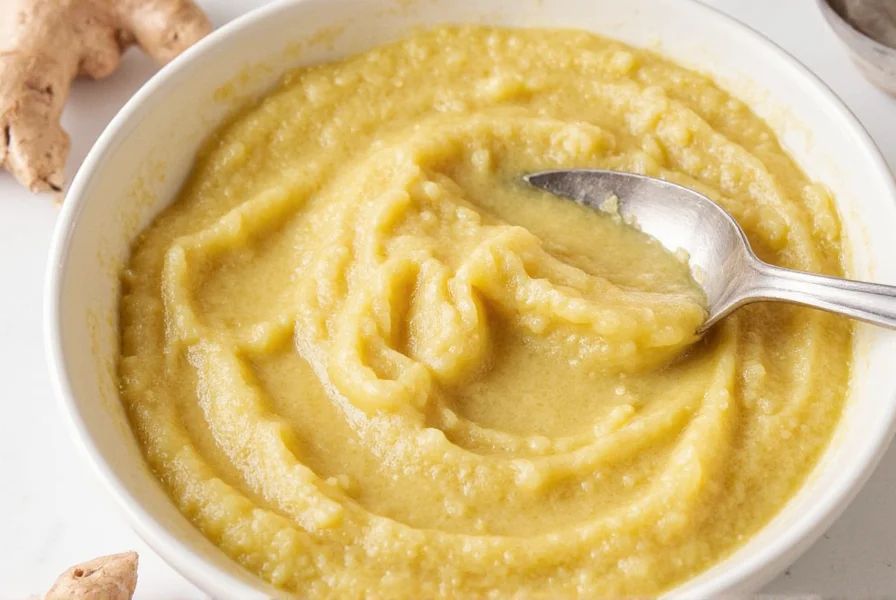For home cooks and professional chefs alike, ginger paste has become an indispensable kitchen staple. This versatile ingredient preserves ginger's complex flavor profile while eliminating the tedious peeling and grating process required with fresh ginger root. Unlike ground ginger powder, which undergoes drying and loses some volatile compounds, ginger paste maintains the fresh, pungent qualities that make ginger so valuable in global cuisines.
What Exactly Is Ginger Paste?
Ginger paste consists of pureed fresh ginger root, sometimes with a small amount of neutral oil, water, or lemon juice to facilitate blending and prevent oxidation. The paste retains ginger's essential oils and active compounds, particularly gingerol, which gives ginger its characteristic heat and numerous health properties. Commercial varieties may contain preservatives, while homemade versions typically contain only ginger and a minimal amount of liquid.
When comparing ginger paste vs fresh ginger, the paste offers several advantages: consistent flavor in every spoonful, no waste from peeling, and easier incorporation into marinades, sauces, and batters. The texture difference means it integrates more smoothly than grated ginger, which can sometimes create fibrous bits in finished dishes.
Benefits of Using Ginger Paste in Your Cooking
The primary advantage of ginger paste is convenience without sacrificing flavor quality. Consider these practical benefits:
- Time efficiency - Eliminates daily peeling and grating of fresh ginger
- Flavor consistency - Provides uniform ginger intensity in every dish
- Reduced waste - Uses nearly 100% of the ginger root
- Better incorporation - Blends seamlessly into liquids and batters
- Extended usability - Lasts significantly longer than fresh ginger
Professional kitchens rely on ginger paste for recipe standardization, ensuring each dish contains precisely the same ginger flavor profile regardless of who prepares it. Home cooks appreciate having this flavor foundation readily available without the hassle of processing fresh ginger each time.

How to Make Ginger Paste at Home
Creating your own ginger paste guarantees freshness and allows complete control over ingredients. Here's a simple method for homemade ginger paste that yields excellent results:
- Peel 1 cup of fresh ginger root using a spoon (this removes skin with minimal waste)
- Cut into 1-inch pieces for easier processing
- Add to food processor with 2-3 tablespoons of neutral oil or water
- Process until completely smooth, scraping down sides as needed
- Transfer to clean glass jar, pressing paste to eliminate air pockets
- Top with 1/4 inch of oil to create an oxygen barrier
- Store in refrigerator for up to 3 weeks
For longer storage, freeze the paste in ice cube trays, then transfer the frozen cubes to an airtight container. This homemade ginger paste recipe produces a vibrant, aromatic product superior to most commercial versions.
Ginger Paste Substitution Guide
Understanding proper substitution ratios is crucial when using ginger paste in recipes. The following table shows accurate conversions:
| Recipe Calls For | Ginger Paste Amount | Notes |
|---|---|---|
| 1 tablespoon fresh grated ginger | 1 tablespoon ginger paste | Direct 1:1 substitution works for most recipes |
| 1 teaspoon fresh grated ginger | 1 teaspoon ginger paste | Use slightly less in delicate dishes |
| 1 inch fresh ginger (about 1 oz) | 1.5 tablespoons ginger paste | Accounts for moisture content difference |
| 1/2 teaspoon ground ginger | 2 teaspoons ginger paste | Ginger paste is less concentrated than powder |
This ginger paste substitution ratio information helps ensure your dishes maintain the intended flavor balance. Remember that ginger paste delivers fresher, brighter flavor than ground ginger, so direct substitution between these two forms requires adjustment.
Proper Storage for Maximum Shelf Life
Understanding how long does ginger paste last depends on storage method:
- Refrigerator - 3-4 weeks when stored in airtight container with oil barrier
- Freezer - 6 months when frozen in portion-sized cubes
- Pantry (commercial) - Check expiration date; typically 1-2 months unopened
Always use clean utensils when handling ginger paste to prevent contamination. Discard if you notice any mold, off odors, or significant color change from the original bright yellow-orange. Properly stored ginger paste maintains its pungency and flavor far longer than fresh ginger roots, which typically last only 1-2 weeks in the refrigerator.

Best Culinary Applications for Ginger Paste
Certain dishes particularly benefit from using ginger paste rather than fresh or powdered ginger:
- Marinades and rubs - Blends evenly without fibrous bits
- Soups and stews - Distributes flavor uniformly throughout liquid
- Baking - Incorporates smoothly into batters and doughs
- Curry bases - Forms excellent foundation with garlic paste
- Smoothies and beverages - No gritty texture
When making Asian stir-fries, add ginger paste early in the cooking process to allow its flavors to bloom in hot oil. For Indian curries, combine with garlic paste in equal parts as the flavor base. In baking applications like gingerbread or cookies, ginger paste provides more complex flavor than ground ginger alone.
Health Benefits of Ginger Paste
Ginger paste retains most of the beneficial compounds found in fresh ginger, including gingerols, shogaols, and zingerone. Research indicates these compounds may provide:
- Anti-inflammatory effects that may help reduce muscle pain
- Digestive benefits, particularly for nausea relief
- Potential cardiovascular support through blood thinning properties
- Antioxidant activity that combats oxidative stress
The ginger paste health benefits remain largely intact during the paste-making process, though some volatile compounds may diminish over time. For maximum therapeutic benefit, use homemade paste within two weeks rather than relying on commercial products with extended shelf lives.
Frequently Asked Questions
How much ginger paste equals fresh ginger?
One tablespoon of ginger paste equals one tablespoon of freshly grated ginger in most recipes. This 1:1 substitution works well for soups, stews, and sauces where texture isn't critical.
Does ginger paste go bad?
Yes, ginger paste can spoil. Homemade ginger paste lasts 3-4 weeks in the refrigerator when stored properly with an oil barrier. Commercial products typically last 1-2 months after opening. Discard if you notice mold, off odors, or significant color change.
Can I freeze ginger paste?
Absolutely. Freezing is the best method for long-term storage. Pour fresh ginger paste into ice cube trays, freeze solid, then transfer the cubes to an airtight container. Frozen ginger paste maintains quality for 6 months and can be added directly to dishes while still frozen.
Is ginger paste as healthy as fresh ginger?
Ginger paste retains most of the beneficial compounds found in fresh ginger, particularly when homemade and used within a few weeks. Some volatile compounds may diminish over time, so freshly made paste offers the most nutritional benefits compared to commercial products with preservatives.
What's the best way to store ginger paste?
The best storage method involves transferring ginger paste to a clean glass jar, pressing it down to eliminate air pockets, then covering the surface with a thin layer of neutral oil (about 1/4 inch). Seal tightly and refrigerate for up to 4 weeks. For longer storage, freeze in portion-sized cubes.











 浙公网安备
33010002000092号
浙公网安备
33010002000092号 浙B2-20120091-4
浙B2-20120091-4